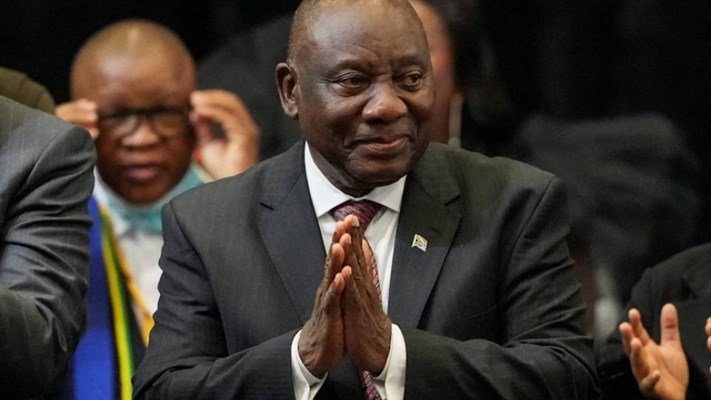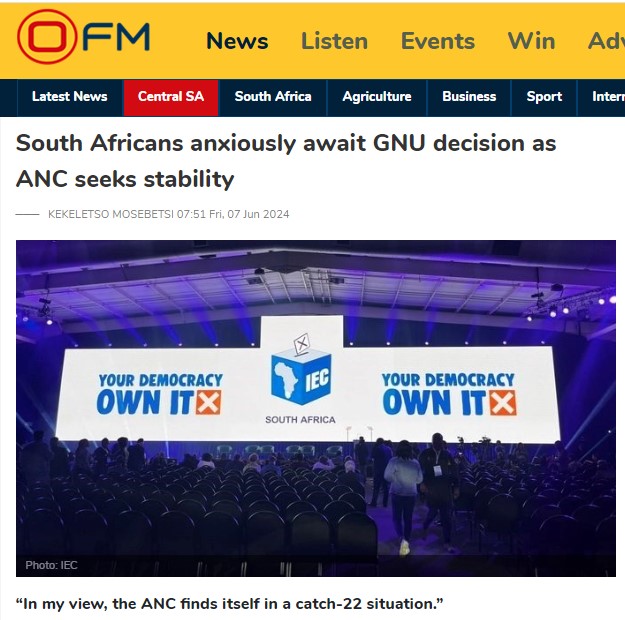Central SA
Will greed for power collapse the GNU marriage?─── KEKELETSO MOSEBETSI 08:10 Tue, 25 Jun 2024

“It is natural and also fair for the parties that join the ANC to (proportionally) expect certain government positions to go their way, but they certainly shouldn’t get greedy.”
As South Africa holds its breath for President Cyril Ramaphosa to announce his new cabinet this week, speculation is rife over whether the lineup will predominantly favour the ruling party or whether opposition parties, particularly the DA, will secure a fair share of seats.
The anticipation comes on the heels of Ramaphosa's second-term inauguration last week and the expected cabinet announcement which has been delayed due to a deadlock within the GNU, involving the ANC and DA.
As GNU negotiations continues and parties jokes for positions, it is fair to bring back this graph that speaks to power dynamics between parties. Significantly, the good for SA will only emerge when there is power balance between contenders, i.e within the narrow corridor. pic.twitter.com/q4wUdXCwH1
— Robert (@matsila) June 25, 2024
Reports indicate that the challenges stem from disagreements over key portfolio allocations and the pivotal role of the position of Deputy President. The DA, having earmarked ten key portfolios, was offered only three by the ANC. This has sparked contention, with ANC delegates arguing that the cabinet’s size necessitates fewer portfolios per party due to the ten participants in the GNU.
The DA federal chair, Helen Zille, has written to ANC Secretary-General Fikile Mbalula, proposing that the DA be granted 11 cabinet positions, including the Deputy Presidency. Additionally, the DA has requested director-general positions for all departments, should their proposal be approved.
Dr Ina Gouws from the Department of Political Studies and Governance at the University of the Free State has highlighted the difficulties in negotiating seat allocations within the GNU. She urged opposition parties to avoid greed during these negotiations.
the #GNU is not an ANC brand. Can we develop a brand conducive of the new #GNU, and produce appropriate stationery! @Our_DA pic.twitter.com/sr1eSMcDyg
— Linda Ferns (@Lindaferns) June 24, 2024
“We all knew this was going to be the difficult part of forming the GNU, and I’m sure as South Africans we all hope that wisdom will prevail. It is natural and also fair for the parties that join the ANC to proportionally expect certain government positions to go their way, but they certainly shouldn’t get greedy,” Gouws stated.
Gouws also emphasised that the ANC must recognise it cannot operate as it traditionally has and will need to concede some cabinet positions. She further suggested that if the parties can navigate these negotiations without a complete collapse, a stable government can be expected.
Having set stringent conditions for their cooperation within the GNU, including significant positions such as the Deputy Presidency for EFF President Julius Malema or the Finance Ministry for the party’s Deputy President, Floyd Shivambu, the EFF omitted to participate in the GNU as the ANC did not agree to the terms.
The EFF’s policies, like land redistribution and the nationalisation of the central bank, add another layer of complexity to the already delicate negotiations.
Additionally, the MK Party has demanded the removal of President Ramaphosa from leadership, showcasing the varied and sometimes conflicting demands within the GNU.
Political Analyst Kelebogile Phago from the North-West University has called for a focus on national interests over personal agendas, urging all parties to prioritise the welfare of South African citizens. He highlighted the intricate dynamics between the ANC and the MK party, suggesting that personal interests, particularly those concerning former President Jacob Zuma, significantly impact their strained relationship.
On the other hand, the ANC Secretary-General and current leader of the African Congress of Transformation (ACT), Ace Magashule, labelled the formation of the GNU as the “government of betrayal”.
The ANC, currently the largest party with 159 seats in the 400-seat National Assembly, is 42 seats short of an outright majority after winning 40% of the votes in South Africa’s seventh democratic general election. The ANC has expressed frustration with the demands for positions from other parties, stating that it will not be held to ransom.
















